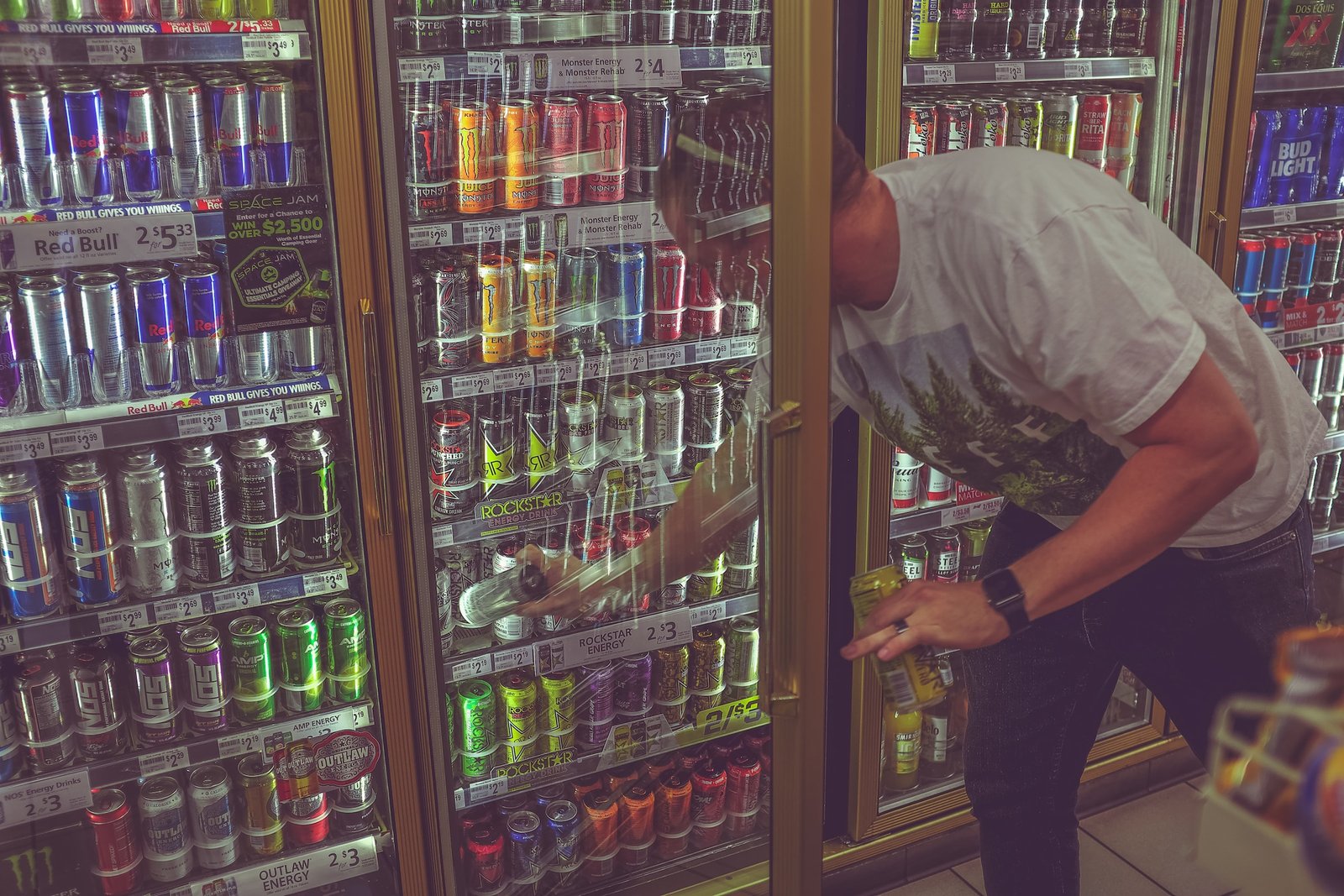Physical Address
304 North Cardinal St.
Dorchester Center, MA 02124


In recent times, we’ve witnessed a global phenomenon – the surging consumption of energy drinks, primarily embraced by adolescents, young adults, and even those in middle-age. But behind the buzz and allure of these beverages lies a growing concern for public health.
In this article we will unleash the truth about energy drinks and dig out more regarding health impacts and risks of energy drinks based on our extensive research on the topic.
What is an Energy Drink?
Think of an energy drink like your go-to boost in a can. Packed with caffeine, sugars, and a mix of additives, it’s the kind of drink that promises to kick your alertness, concentration, and overall energy levels up a notch. Students burning the midnight oil, young adults hustling through the day, and athletes gearing up for action often reach for these drinks when they need that extra jolt during mental or physical challenges. But, hold up – the buzz around their high caffeine and sugar levels has folks talking health risks, sparking debates, and even getting regulators in on the conversation. It’s a sippable topic that’s still unfolding
Ingredients of Energy Drinks
Let’s peel back the label and see what an energy drink typically comprises. The main ingredients of energy drinks beside caffeine are sugar, B vitamins, taurine, glucuronolactone, , ginkgo, guarana, ginseng, biloba, l-carnitine, antioxidants, a minerals. . As the list includes some legal stimulants which can do wonders – by elevating alertness, concentration, and energy levels. They can also potentially raise blood pressure, heart rate, and respiration, making these drinks a go-to for students, young adults, and athletes requiring an energy boost.
The Business of Energy Drinks
The energy drink market, valued at a staggering USD 44.5 billion in 2017, is on an impressive trajectory, expected to witness a robust compound annual growth rate (CAGR) of 7.3% from 2018 to 2026. This segment stands out as the most rapidly evolving within the soft drinks industry, offering promising prospects for future expansion and increased sales.

Marketing campaigns have positioned these drinks as the ideal companions for sports and intense physical or mental exertion. The result? A surge in demand, as they now claim a significant slice, roughly 16% to 18%, of the non-alcoholic beverages market. They face off with titans like brewed coffee and soda. The competition is fierce, especially from ready-to-drink tea and soda, which not only quench thirst but also tout antioxidant benefits.
New players, such as energy shots, have joined the game in emerging markets, riding the coattails of their success in established markets like the United States and the United Kingdom.
Health Risks of Energy Drinks
The consumption of these energy elixirs is linked to a myriad of health concerns that span across various domains.
Effects on the Heart
Caffeine in energy drinks elevates heart rates and blood pressure. These beverages have also been known to cause ventricular arrhythmias and could be troublesome of cardiac patients. They can also mess with platelet activity, potentially leading to more significant problems.
Neurological and Psychological Impacts
Excessive energy drink consumption can lead to caffeine intoxication, a condition characterized by anxiety, insomnia, and gastrointestinal distress. High caffeine intake may trigger acute and chronic daily headaches, along with various psychiatric disorders. Adolescents who consume caffeine have shown tendencies towards violent behaviour, and hallucinations might creep in when caffeine intake exceeds 300 mg per day.
Gastrointestinal and Metabolic Effects
Sugar levels in these drinks are found to be alarmingly high, and excessive use can pose a threat of developing obesity and type 2 diabetes. These sugar-laden potions can also modify the environment of gut bacteria making us more vulnerable to metabolic syndromes. Acute caffeine consumption can tamper with insulin sensitivity, spiking blood glucose levels. In some instances, liver injuries have been reported.
Renal Impact
Energy drinks, can drive diuresis, increasing the risk of dehydration, particularly during prolonged exercise in summers or hot conditions. Caffeine can also lead to sodium losses in urine, affecting plasma volume and overall cardiovascular performance during physical activity. Acute impairment of kidney functions has been observed in individuals with a history of daily energy drink consumption.
Dental Dilemmas
High acidity and sugar content in energy drinks are closely linked to dental erosion. These beverages have the potential to strip away the protective smear layer of teeth, potentially leading to dental hypersensitivity.
Regulation and Legislation
In recent years, the United States has witnessed a growing interest in organic diets, and this wave of consciousness has sparked concerns regarding energy drink consumption. U.S. health and safety committees are actively addressing these concerns, working on legislation to tighten the reins on caffeine sales. As it stands, caffeine is considered safe for use in soda beverages, but energy drinks have historically found refuge under the dietary supplement category. This escape route allowed them to sidestep mandatory caffeine content labelling or adhering to a 200 ppm (parts per million) caffeine cap.

However, the Food and Drug Administration (FDA) is trying to figure out the way forward to safe caffeine utilization. The United Kingdom has already taken a bold step by banning the sale of energy drinks to children under the age of 16.
As for the U.S., the FDA has yet to make any concrete rulings on the sale of non-cola caffeinated products. Nevertheless, the future holds possibilities of regulations or educational initiatives surrounding caffeine consumption. While Europe tends to uphold more stringent food production regulations than the United States, it is expected that any potential ban or regulation on caffeine sales would likely be less rigid than the one enforced in the U.K. in 2019.
Benefits of Energy Drinks
In the midst of all the fretting, let’s not forget, energy drinks can be the unsung heroes. Research says they’ve got a knack for boosting attention, sharpening reactions, and even giving memory and decision-making a little nudge, especially when you’re behind the wheel or in the middle of a game. And hey, the caffeine in these drinks? It’s like a quick mood lifter, throwing in a splash of positivity to your day.
Safe Amount of Caffeine and Energy Drinks
Let’s talk numbers. An adult can consume 400 milligrams of caffein in a day while most of the energy drinks contain 100 to 300 milligrams of caffeine. So, it is ok to take one energy drink in a day keeping in mind no other source of caffeine is taken on same day. But if you’re rocking the pregnancy or breastfeeding gig, it’s savvy to cap your daily caffeine intake at 200 milligrams or less. Safety first!
The American Academy of Paediatrics makes it crystal clear: kiddos and teens should steer clear of caffeine and other energizing stuff found in energy drinks. And for the young athletes out there, The National Federation of State High School Associations echoes the sentiment, saying, “Nope” to using energy drinks for hydration.
Conclusion
The surge in energy drink consumption, predominantly among young adults, has sounded the alarm bells, igniting concerns about public health. These beverages, while promising a quick fix for energy needs, also bring with them a basket of potential health risks.
Efforts are underway to regulate their sale and caffeine content, with a particular focus on safeguarding the vulnerable. While energy drinks have the potential to offer performance benefits, it’s crucial to remember the significance of responsible consumption and being mindful of potential health risks. Education and regulation are the twin pillars we need to strike a balance between the allure of that energy buzz and the preservation of our well-being